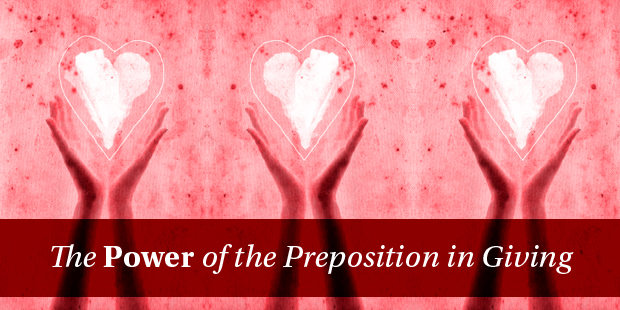
The Power of the Preposition in Giving
Why do people give?
That’s easy.
They give from the heart, to vision.
Let’s start off with the “from” part.
All giving is a matter of the heart. I can’t think of anything more counter-cultural than parting with resources. If someone gives, they do it because something deep and internal has been affected.
A lot of teaching on stewardship is guilt-based, even fear-based. I don’t like it, and I don’t think it’s biblical. Yes, the Bible teaches that there are blessings with giving. Yes, the Bible teaches that any act of obedience or disobedience has consequence.
But that’s not what God wants to motivate us.
I was recently reading through Exodus and was amazed (again) to read how Moses had to tell the people to stop giving because they had more than they needed to construct all that God had commanded in terms of the Tabernacle.
Any of you pastors ever have to preach that message?
But their hearts were so taken that they couldn’t stop giving to the God who had liberated them from every bondage.
This is why Paul, in the New Testament, instructed people to give from their hearts. He knew it was the most powerful area to scour for motivation and obligation for the needs of the kingdom of God.
But people don’t just give “from,” but “to.” And what they give “to” is vision.
Vision is the destination. The goal. The promised land.
For Meck, it’s 20,000 active attenders with ministry in 20 countries. That’s 20,000 changed lives. That’s partnering with 20 incredibly-needy partners who are doing God’s work in ways we never could. That’s making a difference with our one and only life in ways few could ever imagine.
We teach people that giving is an act of worship. And, of course, it is.
But it is more than money.
It is the giving of our hearts, and then the commitment of our wills to the cause.
And God smiles on the giver.
And God honors the giver.
And God gives to the giver.
No wonder people give.

Tags: Giving, James Emery White, Vision, heart












